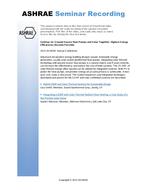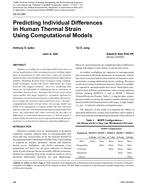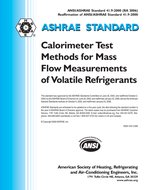In pursuit of development of simplified energy calculation methodologies, seasonalperformance models for residential heating and cooling systems were developed. Previous studies have shown that the variable-base degree-day (VBDD)method renders results close to those generated by hourly models, such as DOE-2.However, the results included only heating and cooling loads, not energy use.The objective of this research was to develop a method for calculation of seasonalperformance of residential HVAC equipment, which could be used within theframework of the variable-base degree-day method.
Using the results of DOE-2 on 60 residences representing 10 climatological conditions, seasonal performance models were developed for gas and oil furnaces, heat pumps (heating mode), and air conditioners. These models utilize the heating and cooling loads calculated by VBDD, equipment specifications, and weather information to calculate the seasonal efficiencies for residential HVAC equipment. Results obtained using these seasonal models were mainly within five percent of those calculated hourly by DOE-2.
Product Details
- Published:
- 1982
- File Size:
- 1 file , 1.1 MB
- Product Code(s):
- D-TO-2715
- Note:
- This product is unavailable in Russia, Belarus


